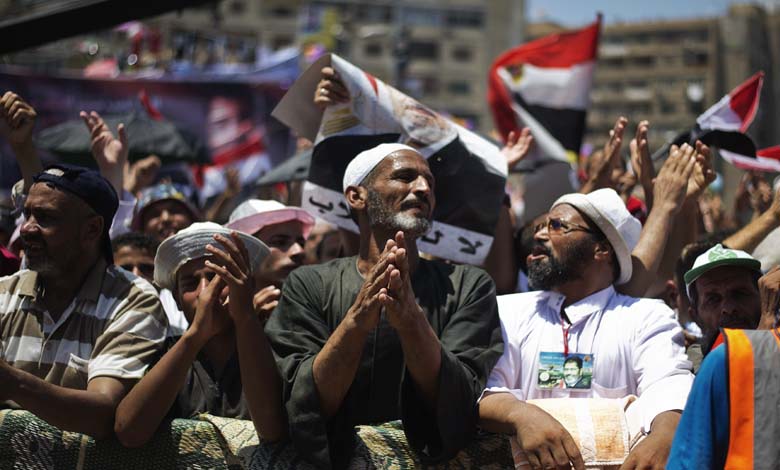11 Years After the Sit-In Dispersal: The Anniversary of “Rabia” Deepens Divisions Within the Muslim Brotherhood

The 11th anniversary of the dispersal of the Muslim Brotherhood‘s sit-in, branded as a terrorist organization, at Rabia Square in eastern Cairo, coincides with ongoing organizational and political conflicts among the movement’s rival factions.
-
Wide Egyptian rejection of the European Parliament’s report on elections in Egypt: It serves the Muslim Brotherhood Agenda
-
The Egyptian-Turkish rapprochement puts the Muslim Brotherhood in a dilemma ahead of the Egyptian elections
On August 14, 2013, Egyptian army and police forces ended the armed sit-in of the Muslim Brotherhood at Rabia al-Adawiya Square in the Nasr City district, eastern Cairo, bringing an end to 55 days of terror rhetoric emanating from the platforms of the Nahda sit-in in Giza (west of Cairo) and Rabia al-Adawiya.
In August of this year, disagreements between the movement’s factions escalated, with several members criticizing the group’s leadership since 2013 and calling for the election of a new guide to replace the current Mohamed Badie, imprisoned in Egypt. Others have called on the rival factions to focus on solving the issue of the movement’s prisoners, while some criticized the leadership for profiting from their organizational positions.
-
Expert reveals differences among the Muslim Brotherhood due to the Presidential Elections in Egypt
-
Three Muslim Brotherhood Rumors Denied by Egypt
Calls for Electing a New Guide
These disagreements were also reflected in the media coverage by the movement’s platforms for the anniversary of “Rabia.” Two of the three major factions (Istanbul and the General Office) commemorated the event in the second week of August, while the third faction (London/Salah Abdelhaq) delayed its response, publishing no statements before August 14, unlike in previous years.
The head of the political office of this third faction, Helmi al-Jazzar, after ten months of silence, posted on his official account on the “X” platform, marking the anniversary of the death of senior Brotherhood leader Essam El-Erian on August 13, 2020, without mentioning the “Rabia” anniversary, which the group typically uses to criticize the Egyptian government.
-
The Muslim Brotherhood launches a preemptive campaign to cast doubt on the Egyptian presidential elections… Details
-
Will the upcoming elections in Egypt bring the Muslim Brotherhood back to the forefront? And who is keeping an eye on them?
In contrast, the acting guide of the Istanbul faction, Mahmoud Hussein, dedicated his weekly message to the sit-in dispersal anniversary, titled “Rabia: Symbol of Bravery and Sacrifice,” comparing the dispersal to the ongoing war in Gaza. Meanwhile, the acting guide of the London faction, Salah Abdelhaq, titled his message “The Principles and Methods of Change in the Movement’s Vision.”
Disputes over Political Strategy
These differences in positions reflect the deepening of organizational divisions within the movement, with each faction adopting a different political approach. The Istanbul faction holds onto a traditional hostile stance towards the Egyptian government, while the London faction is open to reconciliation with the regime in exchange for returning to political life, a proposal Cairo has repeatedly rejected.
-
What Would Have Happened If the Muslim Brotherhood Continued to Rule in Egypt? Researcher Answers
-
10 years since the fall of the Muslim Brotherhood… A harvest of terrorism and chaos in Egypt
Divisions Over Political Direction
These political differences emerged alongside the movement’s split into different factions, following the arrest of former acting guide Mahmoud Ezzat in August 2020. The Istanbul faction accuses the London faction of attempting to implement a project inspired by former executive member Abdel Moneim Abou El-Fotouh to undermine the Brotherhood‘s foundations. A document attributed to the London faction and published by websites linked to the Istanbul faction confirms these accusations.
The London faction believes that the Brotherhood has been facing difficult circumstances since 2013, necessitating a “tactical maneuver” to allow the movement to return to the political scene. This strategy was manifested in their decision to withdraw from political competition, announced in a political document two years ago.
-
As June 30 approaches… Testimonies reveal how Egypt triumphed over the Muslim Brotherhood
-
Did the Muslim Brotherhood seek a return through national dialogue in Egypt?
The London/Salah Abdelhaq faction’s political project focuses on freeing prisoners and reconciling with political forces in Egypt. Helmi al-Jazzar, head of the political office of this faction, is one of the leading promoters of this project, viewed by some as an extension of Abdel Moneim Abou El-Fotouh’s ideas, further deepening divisions within the movement.
On the other hand, the Istanbul faction’s leaders view this project as an attempt to overturn the Brotherhood’s traditional agenda without offering tangible benefits, especially since Egyptian authorities reject the idea of reintegrating the Muslim Brotherhood into the political landscape.
-
Dissident Muslim Brotherhood member: The group is facing major crises and confusion amid the Turkish-Egyptian rapprochement
-
The path of solution – The Muslim Brotherhood in Turkey pays the price of reconciliation with Egypt
Preoccupations of the Movement’s Cadres
The severity of the differences between the Brotherhood‘s factions demonstrates that the leadership seeks to occupy its cadres with secondary discussions, such as evaluating the movement’s performance, to divert attention from internal criticism.
However, the persistence of these divisions has led many members to criticize the leaders of the three factions, accusing them of harming the movement. They have also condemned corruption within the Brotherhood’s institutions, tolerated by those who benefit from it.
-
Egypt’s Muslim Brotherhood also failed to convince el-Sisi’s opponents
-
Muslim Brotherhood plot to cause chaos in Egypt and Arab countries – Details
Though the movement’s leadership maintained the same stance on the 11th anniversary of the Rabia sit-in dispersal, the internal divisions and repetition of the same messages have led to a loss of interest among members, with some calling for elections to choose new leaders.












